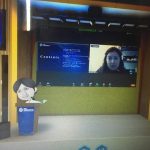
Near East University Institute of Educational Sciences Director, Social Research and Development Center Co-chair Prof. Dr. Fahriye Altınay and Deputy Director of the Institute of Educational Sciences, Head of the Department of Educational Sciences and Co-Chair of the Social Research and Development Center Prof. Dr. Zehra Altınay participated as guest speakers at the Global Smart Education 2020 Conference organized online by UNESCO and the European Commission at Beijing University.
At the conference, which was organized with the theme of information technologies and distance education applications and emphasized the use of smart environments and artificial intelligence, Prof. Dr. Fahriye Altınay shared her knowledge and experience on the importance of open data sources in integrative education, representing the central and Eastern Europe region.
Drawing attention to the importance of teacher training and developing the perception of open pedagogy in using open data sources, Prof. Dr. Altınay emphasized the importance of giving equality to the aggrieved groups who are evaluated in terms of the accessibility and convenience of open data sources by referring to the integrative training examples and strategies carried out in the world.
Prof. Dr. Fahriye Altınay expressed her happiness in introducing the book to the world and the Near East University being a stakeholder institution. The book will be translated into Turkish with the contributions of UNESCO and will be presented to stakeholders as an open data source.
She shared her views on the education of the future ...
Deputy Director of the Institute of Educational Sciences, Head of the Educational Sciences Department of the Faculty of Education, and Co-Chair of the Social Research and Development Center Prof. Dr. Zehra Altınay emphasized the contributions of natural sciences to social sciences in the education of the future, the importance of technology-supported learning and developing policies.

